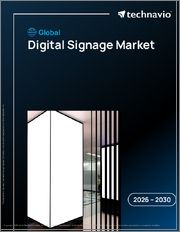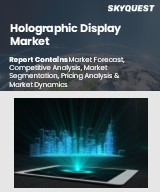
|
시장보고서
상품코드
1642820
디지털 사이니지 시장 규모, 점유율, 동향, 예측 : 유형, 컴포넌트, 기술, 용도, 장소, 사이즈, 지역별(2025-2033년)Digital Signage Market Size, Share, Trends and Forecast by Type, Component, Technology, Application, Location, Size, and Region, 2025-2033 |
||||||
디지털 사이니지 세계 시장 규모는 2024년 285억 달러에 달했습니다. IMARC Group은 향후 2033년까지 시장이 489억 5,000만 달러에 달하고, 2025년부터 2033년에 걸쳐 5.56%의 연평균 복합 성장률(CAGR)을 나타낼 것으로 예측했습니다. 현재 북미는 시장을 독점하고 있으며 2024년 시장 점유율은 37.2%를 넘어섰습니다. 인터랙티브하고 시각적으로 매력적인 컨텐츠에 대한 수요 증가, 디스플레이 기술의 일부 개선, 스마트 시티의 영향력 증가가 시장 성장을 가속하고 있습니다.
디지털 사이니지 시장 분석 :
시장 성장과 규모 : 디지털 사이니지 세계 시장은 다양한 산업 분야에서의 채택으로 상당한 성장을 이루고 있습니다. 인터랙티브하고 시각적으로 매력적인 커뮤니케이션 도구에 대한 수요가 증가하고 시장이 계속 확대되고 있습니다.
주요 시장 성장 촉진요인: 사물 인터넷(IoT) 기술의 디지털 사이니지에의 통합, 지속가능성과 에너지 효율적인 사이니지 솔루션의 중시 증가, COVID-19의 유행에 의한 터치리스 및 비접촉형 디스플레이 수요 증가, 소매 섹터의 확대에 의한 디지털 광고의 요구 증가 등이 시장을 촉진하고 있는 주요 요인입니다.
기술 발달 : 인공지능(AI), 5세대(5G) 연결, 증강현실(AR)과 같은 기술 혁신은 디지털 사이니지의 기능을 지속적으로 강화하여 더욱 범용적이고 효과적인 것으로 만들고 있습니다.
산업 응용: 디지털 간판은 소매, 건강 관리, 교통, 교육, 접객와 같은 분야에서 응용되어 동적 컨텐츠 전달, 정보 발신, 대화형 고객 경험을 가능하게 합니다.
주요 시장 동향 : 주요 시장 동향으로는 원격 컨텐츠 관리를 위한 클라우드 기반 디지털 사이니지 솔루션의 성장, 컨텐츠 최적화를 위한 데이터 분석 활용 확대, 외식 산업에서 디지털 메뉴 보드 확대 등이 있습니다.
지역별 동향 : 아시아태평양은 소매 부문 확대, 기술 도입, 스마트 시티 개념에 대한 투자로 시장 성장을 이끌고 있습니다. 북미와 유럽 역시 소매업과 헬스케어 분야가 견인하여 큰 성장을 보이고 있습니다.
경쟁 구도: 경쟁 구도에는 수많은 솔루션 제공업체와 하드웨어 제조업체가 있습니다. 전략적 제휴와 인수가 혁신과 시장 확대를 뒷받침하고 있습니다.
과제와 기회: 과제는 표준화의 필요성, 컨텐츠 보안, 다양한 플랫폼과의 호환성 등을 포함합니다. 비즈니스 기회는 신흥국에서 시장 확대, 다양한 산업의 진화하는 요구에 대응, 디지털 사이니지 솔루션의 개인화와 인터랙티브성 강화에 있습니다.
디지털 사이니지 시장 동향 :
다양한 산업에서 디지털 광고 솔루션 채택 증가
세계 디지털 사이니지 시장은 주로 다양한 산업에서 디지털 광고 솔루션의 채택이 증가하고 있기 때문에 현저한 급성장을 이루고 있습니다. 이는 디지털 사이니지의 다용도와 역동적인 기능을 통해 기존의 인쇄 광고에서 디지털 디스플레이로의 전환을 더욱 향상시킵니다. 소매, 헬스케어, 운송 등 업계에서는 디지털 사이니지를 활용하여 타겟 잠재고객의 관심을 효과적으로 이끌고 있습니다. 예를 들어 소매업에서는 디지털 사이니지를 점내 프로모션에 활용하여 고객 경험을 향상시키고 있습니다. 의료 시설에서는 환자와 방문자에게 중요한 정보를 제공하기 위해 디지털 간판을 사용합니다. 교통 수단은 공항 비행 정보와 대중 교통 시간표 등 실시간 최신 정보를 디지털 간판으로 제공합니다. 이러한 추세는 정보, 광고 및 프로모션 전달에 있어서 디지털 사이니지의 효과를 반영하며, 커뮤니케이션 전략의 강화를 목표로 하는 기업들에게 디지털 사이니지가 매력적인 선택이 되고 있습니다.
시각적으로 매력적이고 인터랙티브한 컨텐츠에 대한 수요 급증
세계 디지털 간판 시장을 형성하는 또 다른 중요한 원동력은 시각적으로 매력적이고 대화식 컨텐츠 전달 메커니즘에 대한 수요가 증가하고 있습니다. 전통적인 정적 사이니지가 매력을 잃을수록 기업은 잠재고객을 매료시키는 디지털 사이니지에 눈을 돌리고 있습니다. 생생한 고해상도 디스플레이와 인터랙티브 기능으로 디지털 간판은 몰입감 있는 경험을 제공합니다. 소비자는 주의를 끌고 메시지를 효과적으로 전달하는 시각적으로 매력적인 컨텐츠에 끌리기 때문에 디지털 간판의 보급이 진행되고 있습니다.
디스플레이 기술의 발전
디지털 사이니지 시장은 LED 및 유기 LED(OLED)와 같은 디스플레이 기술의 끊임없는 발달에 영향을 받고 있습니다. 이러한 디스플레이는 고해상도, 색 정밀도 향상, 에너지 효율 향상 등을 실현하여 디지털 사이니지용 디스플레이의 비주얼 품질을 높여줍니다. 예를 들어 LED 디스플레이는 밝기와 내구성으로 알려져 있으며 실외 및 실내 응용 분야에 적합합니다. OLED 디스플레이는 뛰어난 대비와 유연성을 제공하여 곡선형에 견딜 수 없는 화면 설계를 가능하게 합니다. 이러한 발전으로 기업과 조직은 최신 디스플레이 기술을 활용하여 시각적으로 매력적인 컨텐츠를 제공하는 디지털 사이니지 솔루션에 투자하게 되었습니다.
실시간 정보 발신
실시간 정보 발신은 특히 시기적절한 갱신이 중요한 분야에서 세계 디지털 사이니지 시장의 매우 중요한 원동력이 되고 있습니다. 디지털 사이니지 시스템은 순간적으로 정보를 전달할 수 있기 때문에 긴급시나 교통, 공공장소 등에서는 빠뜨릴 수 없는 것이 되고 있습니다. 긴급 상황에서는 디지털 간판이 안전 지침과 대피 경로를 신속하게 전달하고 인명을 구할 수 있습니다. 교통에서 디지털 간판은 출발, 도착, 지연의 최신 정보를 실시간으로 제공하여 승객 경험을 향상시킵니다. 공공 공간에서 디지털 간판은 뉴스와 이벤트의 최신 정보, 중요한 소식을 공유하는 동적 플랫폼 역할을합니다. 이 드라이버는 적시에 적절한 정보를 제공하는 디지털 간판의 중요성을 강조하고 다양한 분야에서 의사 소통과 안전을 향상시키는 귀중한 도구입니다.
목차
제1장 서문
제2장 조사 범위와 조사 방법
- 조사의 목적
- 이해관계자
- 데이터 소스
- 1차 정보
- 2차 정보
- 시장 추정
- 상향식 접근
- 하향식 접근
- 조사 방법
제3장 주요 요약
제4장 소개
- 개요
- 주요 업계 동향
제5장 세계 디지털 사이니지 시장
- 시장 개요
- 시장 실적
- COVID-19의 영향
- 시장 예측
제6장 시장 분석 : 유형별
- 비디오 월
- 시장 동향
- 시장 예측
- 비디오 스크린
- 시장 동향
- 시장 예측
- 투명 LED 스크린
- 시장 동향
- 시장 예측
- 디지털 포스터
- 시장 동향
- 시장 예측
- 키오스크
- 시장 동향
- 시장 예측
- 기타
- 시장 동향
- 시장 예측
제7장 시장 분석 : 컴포넌트별
- 하드웨어
- 시장 동향
- 시장 예측
- 소프트웨어
- 시장 동향
- 시장 예측
- 서비스
- 시장 동향
- 시장 예측
제8장 시장 분석 : 기술별
- 액정/LED
- 시장 동향
- 시장 예측
- 투영
- 시장 동향
- 시장 예측
- 기타
- 시장 동향
- 시장 예측
제9장 시장 분석 : 용도별
- 소매
- 시장 동향
- 시장 예측
- 접객
- 시장 동향
- 시장 예측
- 엔터테인먼트
- 시장 동향
- 시장 예측
- 경기장과 놀이터
- 시장 동향
- 시장 예측
- 기업
- 시장 동향
- 시장 예측
- 은행 업무
- 시장 동향
- 시장 예측
- 헬스케어
- 시장 동향
- 시장 예측
- 교육
- 시장 동향
- 시장 예측
- 수송
- 시장 동향
- 시장 예측
- 기타
- 시장 동향
- 시장 예측
제10장 시장 내역: 장소별
- 실내
- 시장 동향
- 시장 예측
- 옥외
- 시장 동향
- 시장 예측
제11장 시장 분석 : 사이즈별
- 32인치 이하
- 시장 동향
- 시장 예측
- 32-52인치
- 시장 동향
- 시장 예측
- 52인치 이상
- 시장 동향
- 시장 예측
제12장 시장 분석 : 지역별
- 북미
- 미국
- 캐나다
- 아시아태평양
- 중국
- 일본
- 인도
- 한국
- 호주
- 인도네시아
- 기타
- 유럽
- 독일
- 프랑스
- 영국
- 이탈리아
- 스페인
- 러시아
- 기타
- 라틴아메리카
- 브라질
- 멕시코
- 기타
- 중동 및 아프리카
- 시장 동향
- 시장 분석 : 국가별
- 시장 예측
제13장 SWOT 분석
- 개요
- 강점
- 약점
- 기회
- 위협
제14장 밸류체인 분석
제15장 Porter's Five Forces 분석
- 개요
- 구매자의 협상력
- 공급기업의 협상력
- 경쟁도
- 신규 진입업자의 위협
- 대체품의 위협
제16장 가격 분석
제17장 경쟁 구도
- 시장 구조
- 주요 기업
- 주요 기업 프로파일
- BARCO
- Leyard Optoelectronic(Planar)
- LG전자
- Panasonic
- Samsung Electronics
- Shanghai Goodview Electronics
- Sharp(Foxconn Group)
- Sony
The global digital signage market size was valued at USD 28.5 Billion in 2024. Looking forward, IMARC Group estimates the market to reach USD 48.95 Billion by 2033, exhibiting a CAGR of 5.56% from 2025-2033. North America currently dominates the market, holding a market share of over 37.2% in 2024. The escalating demand for interactive and visually engaging content, several improvements in display technologies, and the growing influence of smart cities are driving the market growth.
Digital Signage Market Analysis:
Market Growth and Size: The global digital signage market has witnessed substantial growth, driven by its adoption across various industries. It continues to expand, with a rising demand for interactive and visually engaging communication tools.
Major Market Drivers: the integration of the Internet of Things (IoT) technology into digital signage, growing emphasis on sustainability and energy-efficient signage solutions, increasing demand for touchless and contactless displays due to the COVID-19 pandemic, and expansion of the retail sector, enhancing the need for digital advertising are some of the key factors propelling the market.
Technological Advancements: Technological innovation, including artificial intelligence (AI), fifth generation (5G) connectivity, and augmented reality (AR), continues to enhance the capabilities of digital signage, making it more versatile and effective.
Industry Applications: Digital signage finds applications in retail, healthcare, transportation, education, and hospitality sectors, enabling dynamic content delivery, information dissemination, and interactive customer experiences.
Key Market Trends: The key market trends include growth of cloud-based digital signage solutions for remote content management, increasing use of data analytics for content optimization, and expansion of digital menu boards in the food service industry.
Geographical Trends: The Asia-Pacific region leads in market growth due to its expanding retail sector, technological adoption, and investment in smart city initiatives. North America and Europe also exhibit significant growth, driven by the retail and healthcare sectors.
Competitive Landscape: The digital signage market features a competitive landscape with numerous solution providers and hardware manufacturers. Strategic partnerships and acquisitions drive innovation and market expansion.
Challenges and Opportunities: Challenges include the need for standardization, content security, and compatibility with diverse platforms. Opportunities lie in expanding the market reach in emerging economies, addressing the evolving needs of various industries, and enhancing the personalization and interactivity of digital signage solutions.
Digital Signage Market Trends:
Increasing adoption of digital advertising solutions across various industries
The global digital signage market is experiencing a notable surge in growth primarily due to the increasing adoption of digital advertising solutions across various industries. This is further underpinned by the shift from traditional printed advertising to digital displays, driven by the versatility and dynamic capabilities of digital signage. Industries such as retail, healthcare, and transportation are leveraging digital signage to engage their target audience effectively. Retailers, for instance, employ digital signage for in-store promotions, enhancing customer experiences. Healthcare facilities use digital signage to provide critical information to patients and visitors. In the transportation sector, digital signage aids in real-time updates, such as flight information at airports and public transportation schedules. This trend reflects the effectiveness of digital signage in conveying information, advertisements, and promotions, making it a compelling choice for businesses seeking to enhance their communication strategies.
Surging demand for visually engaging and interactive content
Another significant driver shaping the global digital signage market is the ever-growing demand for visually engaging and interactive content delivery mechanisms. As traditional static signage loses its appeal, businesses are turning to digital signage to captivate their audiences. With vibrant high-definition displays and interactive features, digital signage provides an immersive experience. The widespread adoption of digital signage as consumers are drawn to visually appealing content that holds their attention and conveys messages effectively.
Advancements in display technologies
The digital signage market is strongly influenced by continuous advancements in display technologies, such as light emitting diode (LED) and organic light emitting diode (OLED). They offer higher resolutions, improved color accuracy, and energy efficiency, enhancing the visual quality of digital signage displays. LED displays, for instance, are known for their brightness and durability, making them suitable for outdoor and indoor applications. OLED displays provide superior contrast ratios and flexibility, enabling curved and unconventional screen designs. These advancements drive businesses and organizations to invest in digital signage solutions that leverage the latest display technologies to deliver visually stunning content.
Real-Time Information Dissemination
Real-time information dissemination is a pivotal driver for the global digital signage market, particularly in sectors where timely updates are critical. Digital signage systems offer the advantage of instant communication, making them indispensable in emergency situations, transportation hubs, and public spaces. During emergencies, digital signage can quickly convey safety instructions and evacuation routes, potentially saving lives. In transportation, digital signage provides real-time updates on departures, arrivals, and delays, improving passenger experiences. In public spaces, digital signage serves as a dynamic platform for sharing news, event updates, and important announcements. This driver highlights the importance of digital signage in providing timely and relevant information, making it an invaluable tool for enhancing communication and safety across various sectors.
Digital Signage Industry Segmentation:
Breakup by Type:
Video Walls
Video Screen
Transparent LED Screen
Digital Poster
Kiosks
Others
Video walls accounts for the majority of the market share
Breakup by Component:
Hardware
Software
Service
Hardware holds the largest share in the industry
Breakup by Technology:
LCD/LED
Projection
Others
LCD/LED represents the leading market segment
Breakup by Application:
Retail
Hospitality
Entertainment
Stadiums and Playgrounds
Corporate
Banking
Healthcare
Education
Transport
Others
Retail holds the largest share in the industry
Breakup by Location:
Indoor
Outdoor
Indoor represents the leading market segment
Breakup by Size:
Below 32 Inches
32 to 52 Inches
More than 52 Inches
Below 32 inches represents the leading market segment
Breakup by Region:
North America
United States
Canada
Asia Pacific
China
Japan
India
South Korea
Australia
Indonesia
Others
Europe
Germany
France
United Kingdom
Italy
Spain
Russia
Others
Latin America
Brazil
Mexico
Others
Middle East and Africa
North America leads the market, accounting for the largest digital signage market share
The market research report has also provided a comprehensive analysis of all the major regional markets, which include North America (the United States and Canada); Asia Pacific (China, Japan, India, South Korea, Australia, Indonesia, and others); Europe (Germany, France, the United Kingdom, Italy, Spain, Russia and others); Latin America (Brazil, Mexico, and others); and the Middle East and Africa. According to the report, North America accounted for the largest market share.
The market research report has provided a comprehensive analysis of the competitive landscape. Detailed profiles of all major companies have also been provided. Some of the key players in the market include:
BARCO
Leyard Optoelectronic (Planar)
LG Electronics
Panasonic
Samsung Electronics
Shanghai Goodview Electronics
Sharp (Foxconn Group)
Sony
Key Questions Answered in This Report
- 1. What is digital signage?
- 2. How big is the global digital signage market?
- 3. What is the expected growth rate of the global digital signage market during 2025-2033?
- 4. What are the key factors driving the global digital signage market?
- 5. What is the leading segment of the global digital signage market based on type?
- 6. What is the leading segment of the global digital signage market based on component?
- 7. What is the leading segment of the global digital signage market based on technology?
- 8. What is the leading segment of the global digital signage market based on location?
- 9. What is the leading segment of the global digital signage market based on size?
- 10. What are the key regions in the global digital signage market?
- 11. Who are the key players/companies in the global digital signage market?
Table of Contents
1 Preface
2 Scope and Methodology
- 2.1 Objectives of the Study
- 2.2 Stakeholders
- 2.3 Data Sources
- 2.3.1 Primary Sources
- 2.3.2 Secondary Sources
- 2.4 Market Estimation
- 2.4.1 Bottom-Up Approach
- 2.4.2 Top-Down Approach
- 2.5 Forecasting Methodology
3 Executive Summary
4 Introduction
- 4.1 Overview
- 4.2 Key Industry Trends
5 Global Digital Signage Market
- 5.1 Market Overview
- 5.2 Market Performance
- 5.3 Impact of COVID-19
- 5.4 Market Forecast
6 Market Breakup by Type
- 6.1 Video Walls
- 6.1.1 Market Trends
- 6.1.2 Market Forecast
- 6.2 Video Screen
- 6.2.1 Market Trends
- 6.2.2 Market Forecast
- 6.3 Transparent LED Screen
- 6.3.1 Market Trends
- 6.3.2 Market Forecast
- 6.4 Digital Poster
- 6.4.1 Market Trends
- 6.4.2 Market Forecast
- 6.5 Kiosks
- 6.5.1 Market Trends
- 6.5.2 Market Forecast
- 6.6 Others
- 6.6.1 Market Trends
- 6.6.2 Market Forecast
7 Market Breakup by Component
- 7.1 Hardware
- 7.1.1 Market Trends
- 7.1.2 Market Forecast
- 7.2 Software
- 7.2.1 Market Trends
- 7.2.2 Market Forecast
- 7.3 Service
- 7.3.1 Market Trends
- 7.3.2 Market Forecast
8 Market Breakup by Technology
- 8.1 LCD/LED
- 8.1.1 Market Trends
- 8.1.2 Market Forecast
- 8.2 Projection
- 8.2.1 Market Trends
- 8.2.2 Market Forecast
- 8.3 Others
- 8.3.1 Market Trends
- 8.3.2 Market Forecast
9 Market Breakup by Application
- 9.1 Retail
- 9.1.1 Market Trends
- 9.1.2 Market Forecast
- 9.2 Hospitality
- 9.2.1 Market Trends
- 9.2.2 Market Forecast
- 9.3 Entertainment
- 9.3.1 Market Trends
- 9.3.2 Market Forecast
- 9.4 Stadiums and Playgrounds
- 9.4.1 Market Trends
- 9.4.2 Market Forecast
- 9.5 Corporate
- 9.5.1 Market Trends
- 9.5.2 Market Forecast
- 9.6 Banking
- 9.6.1 Market Trends
- 9.6.2 Market Forecast
- 9.7 Healthcare
- 9.7.1 Market Trends
- 9.7.2 Market Forecast
- 9.8 Education
- 9.8.1 Market Trends
- 9.8.2 Market Forecast
- 9.9 Transport
- 9.9.1 Market Trends
- 9.9.2 Market Forecast
- 9.10 Others
- 9.10.1 Market Trends
- 9.10.2 Market Forecast
10 Market Breakup by Location
- 10.1 Indoor
- 10.1.1 Market Trends
- 10.1.2 Market Forecast
- 10.2 Outdoor
- 10.2.1 Market Trends
- 10.2.2 Market Forecast
11 Market Breakup by Size
- 11.1 Below 32 Inches
- 11.1.1 Market Trends
- 11.1.2 Market Forecast
- 11.2 32 to 52 Inches
- 11.2.1 Market Trends
- 11.2.2 Market Forecast
- 11.3 More than 52 Inches
- 11.3.1 Market Trends
- 11.3.2 Market Forecast
12 Market Breakup by Region
- 12.1 North America
- 12.1.1 United States
- 12.1.1.1 Market Trends
- 12.1.1.2 Market Forecast
- 12.1.2 Canada
- 12.1.2.1 Market Trends
- 12.1.2.2 Market Forecast
- 12.1.1 United States
- 12.2 Asia Pacific
- 12.2.1 China
- 12.2.1.1 Market Trends
- 12.2.1.2 Market Forecast
- 12.2.2 Japan
- 12.2.2.1 Market Trends
- 12.2.2.2 Market Forecast
- 12.2.3 India
- 12.2.3.1 Market Trends
- 12.2.3.2 Market Forecast
- 12.2.4 South Korea
- 12.2.4.1 Market Trends
- 12.2.4.2 Market Forecast
- 12.2.5 Australia
- 12.2.5.1 Market Trends
- 12.2.5.2 Market Forecast
- 12.2.6 Indonesia
- 12.2.6.1 Market Trends
- 12.2.6.2 Market Forecast
- 12.2.7 Others
- 12.2.7.1 Market Trends
- 12.2.7.2 Market Forecast
- 12.2.1 China
- 12.3 Europe
- 12.3.1 Germany
- 12.3.1.1 Market Trends
- 12.3.1.2 Market Forecast
- 12.3.2 France
- 12.3.2.1 Market Trends
- 12.3.2.2 Market Forecast
- 12.3.3 United Kingdom
- 12.3.3.1 Market Trends
- 12.3.3.2 Market Forecast
- 12.3.4 Italy
- 12.3.4.1 Market Trends
- 12.3.4.2 Market Forecast
- 12.3.5 Spain
- 12.3.5.1 Market Trends
- 12.3.5.2 Market Forecast
- 12.3.6 Russia
- 12.3.6.1 Market Trends
- 12.3.6.2 Market Forecast
- 12.3.7 Others
- 12.3.7.1 Market Trends
- 12.3.7.2 Market Forecast
- 12.3.1 Germany
- 12.4 Latin America
- 12.4.1 Brazil
- 12.4.1.1 Market Trends
- 12.4.1.2 Market Forecast
- 12.4.2 Mexico
- 12.4.2.1 Market Trends
- 12.4.2.2 Market Forecast
- 12.4.3 Others
- 12.4.3.1 Market Trends
- 12.4.3.2 Market Forecast
- 12.4.1 Brazil
- 12.5 Middle East and Africa
- 12.5.1 Market Trends
- 12.5.2 Market Breakup by Country
- 12.5.3 Market Forecast
13 SWOT Analysis
- 13.1 Overview
- 13.2 Strengths
- 13.3 Weaknesses
- 13.4 Opportunities
- 13.5 Threats
14 Value Chain Analysis
15 Porters Five Forces Analysis
- 15.1 Overview
- 15.2 Bargaining Power of Buyers
- 15.3 Bargaining Power of Suppliers
- 15.4 Degree of Competition
- 15.5 Threat of New Entrants
- 15.6 Threat of Substitutes
16 Price Analysis
17 Competitive Landscape
- 17.1 Market Structure
- 17.2 Key Players
- 17.3 Profiles of Key Players
- 17.3.1 BARCO
- 17.3.1.1 Company Overview
- 17.3.1.2 Product Portfolio
- 17.3.1.3 Financials
- 17.3.1.4 SWOT Analysis
- 17.3.2 Leyard Optoelectronic (Planar)
- 17.3.2.1 Company Overview
- 17.3.2.2 Product Portfolio
- 17.3.3 LG Electronics
- 17.3.3.1 Company Overview
- 17.3.3.2 Product Portfolio
- 17.3.3.3 Financials
- 17.3.3.4 SWOT Analysis
- 17.3.4 Panasonic
- 17.3.4.1 Company Overview
- 17.3.4.2 Product Portfolio
- 17.3.4.3 Financials
- 17.3.4.4 SWOT Analysis
- 17.3.5 Samsung Electronics
- 17.3.5.1 Company Overview
- 17.3.5.2 Product Portfolio
- 17.3.5.3 Financials
- 17.3.5.4 SWOT Analysis
- 17.3.6 Shanghai Goodview Electronics
- 17.3.6.1 Company Overview
- 17.3.6.2 Product Portfolio
- 17.3.7 Sharp (Foxconn Group)
- 17.3.7.1 Company Overview
- 17.3.7.2 Product Portfolio
- 17.3.8 Sony
- 17.3.8.1 Company Overview
- 17.3.8.2 Product Portfolio
- 17.3.8.3 Financials
- 17.3.8.4 SWOT Analysis
- 17.3.1 BARCO



















